Browse the Library
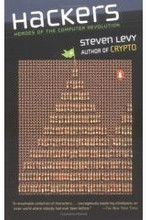 Hackers Steven Levy Levy decided to write about the subject of hackers because he thought they were fascinating people. He also wanted to present a more accurate view of hackers than the one most people had. Levy found them to be 'adventurers, visionaries, risk-takers, [and] artists rather than nerdy social outcasts' or 'unprofessional' programmers who wrote dirty, 'nonstandard' computer code
Hackers Steven Levy Levy decided to write about the subject of hackers because he thought they were fascinating people. He also wanted to present a more accurate view of hackers than the one most people had. Levy found them to be 'adventurers, visionaries, risk-takers, [and] artists rather than nerdy social outcasts' or 'unprofessional' programmers who wrote dirty, 'nonstandard' computer code 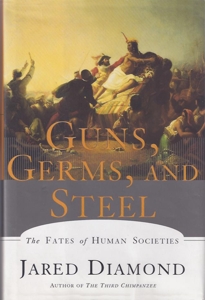 Guns, Germs and Steel Jared Diamond The prologue opens with an account of Diamond's conversation with Yali, a New Guinean politician. The conversation turned to the obvious differences in power and technology between Yali's people and the Europeans who dominated the land for 200 years, differences that neither of them considered due to any genetic superiority of Europeans. Yali asked, using the local term 'cargo' for inventions and manufactured goods, 'Why is it that you white people developed so much cargo and brought it to New Guinea, but we black people had little cargo of our own?
Guns, Germs and Steel Jared Diamond The prologue opens with an account of Diamond's conversation with Yali, a New Guinean politician. The conversation turned to the obvious differences in power and technology between Yali's people and the Europeans who dominated the land for 200 years, differences that neither of them considered due to any genetic superiority of Europeans. Yali asked, using the local term 'cargo' for inventions and manufactured goods, 'Why is it that you white people developed so much cargo and brought it to New Guinea, but we black people had little cargo of our own? 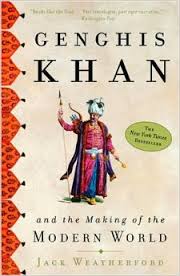 Genghis Khan and the Making of the Modern World Jack Weatherford It is a narrative of the rise and influence of Genghis Khan and his successors, and their influence on European civilization. Weatherford provides a different slant on Genghis Khan than has been typical in most Western accounts, attributing positive cultural effects to his rule.
Genghis Khan and the Making of the Modern World Jack Weatherford It is a narrative of the rise and influence of Genghis Khan and his successors, and their influence on European civilization. Weatherford provides a different slant on Genghis Khan than has been typical in most Western accounts, attributing positive cultural effects to his rule. 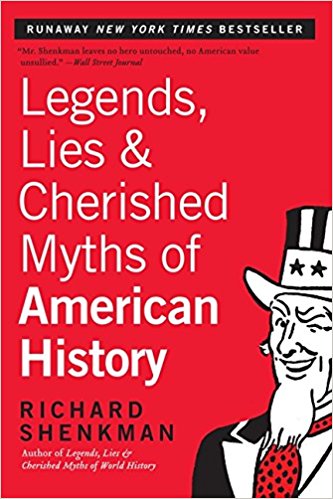 Legends, Lies & Cherished Myths of American History Richard Shenkman The truth and nothing but the truth-Richard Shenkman sheds light on America's most believed legends.
Legends, Lies & Cherished Myths of American History Richard Shenkman The truth and nothing but the truth-Richard Shenkman sheds light on America's most believed legends. 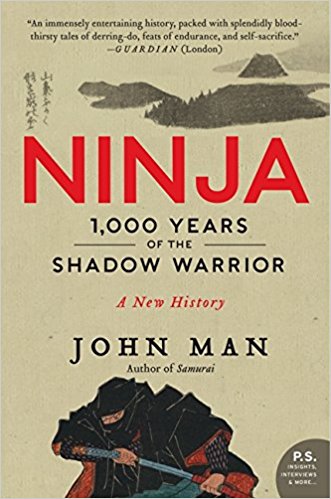 Ninja John Man The first major pop history of the Japanese stealth assassins, John Man's Ninja is a meticulously researched, entertaining blend of mythology, anthropology, travelogue, and history of the legendary shadow warriors.
Ninja John Man The first major pop history of the Japanese stealth assassins, John Man's Ninja is a meticulously researched, entertaining blend of mythology, anthropology, travelogue, and history of the legendary shadow warriors.  Salt Mark Kurlansky The only rock we eat, salt has shaped civilization from the very beginning, and its story is a glittering, often surprising part of the history of humankind. A substance so valuable it served as currency, salt has influenced the establishment of trade routes and cities, provoked and financed wars, secured empires, and inspired revolutions. Populated by colorful characters and filled with an unending series of fascinating details, Salt is a supremely entertaining, multi-layered masterpiece.
Salt Mark Kurlansky The only rock we eat, salt has shaped civilization from the very beginning, and its story is a glittering, often surprising part of the history of humankind. A substance so valuable it served as currency, salt has influenced the establishment of trade routes and cities, provoked and financed wars, secured empires, and inspired revolutions. Populated by colorful characters and filled with an unending series of fascinating details, Salt is a supremely entertaining, multi-layered masterpiece. 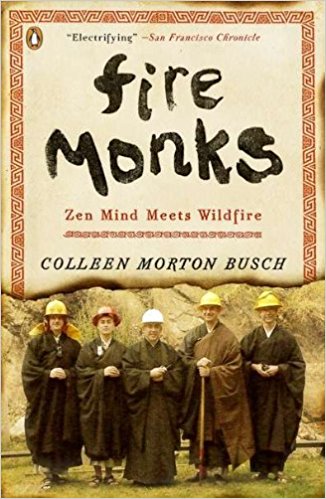 Fire Monks Colleen Busch Disaster struck during the summer months, when Tassajara opens its doors to visitors, and the grounds fill with guests expecting a restful respite. Instead, the mountain air filled with smoke, and monks broke from regular meditation to conduct fire drills. All visitors were evacuated, and many Zen students followed. A small crew of residents and firefighters remained, preparing to defend Tassajara. But nothing could have prepared them for what came next. When a treacherous shift in weather conditions brought danger nearer still, firefighters made the flash decision to completely evacuate the monastery. As the firefighters and remaining residents caravanned out the long road to Tassajara, five monks turned back, risking their lives to save the monastery. Fire Monks is their story.
Fire Monks Colleen Busch Disaster struck during the summer months, when Tassajara opens its doors to visitors, and the grounds fill with guests expecting a restful respite. Instead, the mountain air filled with smoke, and monks broke from regular meditation to conduct fire drills. All visitors were evacuated, and many Zen students followed. A small crew of residents and firefighters remained, preparing to defend Tassajara. But nothing could have prepared them for what came next. When a treacherous shift in weather conditions brought danger nearer still, firefighters made the flash decision to completely evacuate the monastery. As the firefighters and remaining residents caravanned out the long road to Tassajara, five monks turned back, risking their lives to save the monastery. Fire Monks is their story. 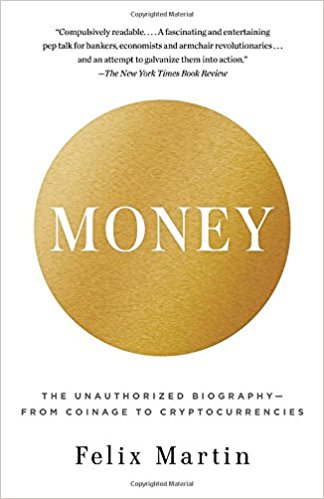 Money Felix Martin What is money, and how does it work? In this tour de force of political, cultural, and economic history, Felix Martin challenges nothing less than our conventional understanding of one of humankind's greatest inventions. Martin describes how the Western idea of money emerged in the ancient world, and was shaped over the centuries by tensions between sovereigns and the emerging middle classes. Money, he argues, has always been an intensely political instrument, and that it is our failure to remember this that led to the crisis in our financial system and the Great Recession.
Money Felix Martin What is money, and how does it work? In this tour de force of political, cultural, and economic history, Felix Martin challenges nothing less than our conventional understanding of one of humankind's greatest inventions. Martin describes how the Western idea of money emerged in the ancient world, and was shaped over the centuries by tensions between sovereigns and the emerging middle classes. Money, he argues, has always been an intensely political instrument, and that it is our failure to remember this that led to the crisis in our financial system and the Great Recession. 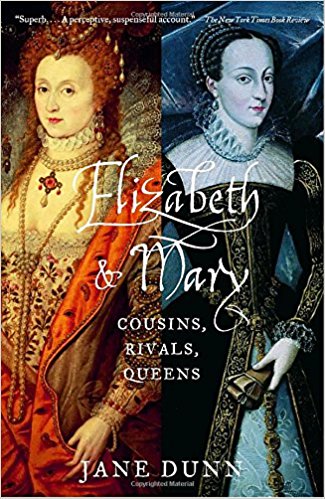 Elizabeth and Mary Jane Dunn Jane Dunn's Elizabeth and Mary: Cousins, Rivals, Queens offers a blend of history and biography that traces the 'dynamic interaction' between two of the most powerful women in Western history. Dunn remains ever aware of the uniqueness of her two central figures: both women ruled as divinely ordained monarchs in a male dominated power structure; and both women were from the same family (Elizabeth I was the granddaughter of Henry VII, and Mary Queen of Scots the great-granddaughter of King Henry).
Elizabeth and Mary Jane Dunn Jane Dunn's Elizabeth and Mary: Cousins, Rivals, Queens offers a blend of history and biography that traces the 'dynamic interaction' between two of the most powerful women in Western history. Dunn remains ever aware of the uniqueness of her two central figures: both women ruled as divinely ordained monarchs in a male dominated power structure; and both women were from the same family (Elizabeth I was the granddaughter of Henry VII, and Mary Queen of Scots the great-granddaughter of King Henry). 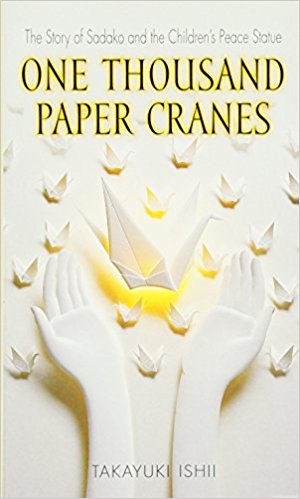 One Thousand Paper Cranes Takayuki Ishii Ten years after the atomic bomb was dropped on Hiroshima, Sadako Sasaki died as a result of atomic bomb disease. Sadako's determination to fold one thousand paper cranes and her courageous struggle with her illness inspired her classmates. After her death, they started a national campaign to build the Children's Peace Statue to remember Sadako and the many other children who were victims of the Hiroshima bombing. On top of the statue is a girl holding a large crane in her outstretched arms. Today in Hiroshima Peace Memorial Park, this statue of Sadako is beautifully decorated with thousands of paper cranes given by people throughout the world.
One Thousand Paper Cranes Takayuki Ishii Ten years after the atomic bomb was dropped on Hiroshima, Sadako Sasaki died as a result of atomic bomb disease. Sadako's determination to fold one thousand paper cranes and her courageous struggle with her illness inspired her classmates. After her death, they started a national campaign to build the Children's Peace Statue to remember Sadako and the many other children who were victims of the Hiroshima bombing. On top of the statue is a girl holding a large crane in her outstretched arms. Today in Hiroshima Peace Memorial Park, this statue of Sadako is beautifully decorated with thousands of paper cranes given by people throughout the world. 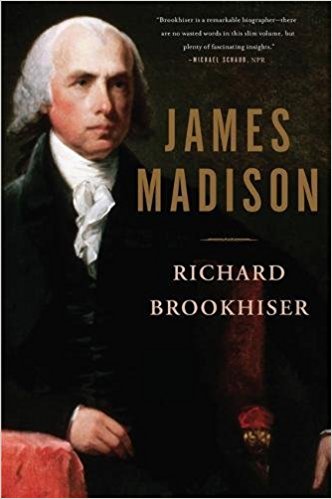 James Madison Richard Brookhiser James Madison led one of the most influential and prolific lives in American history, and his story-although all too often overshadowed by his more celebrated contemporaries-is integral to that of the nation. Madison helped to shape our country as perhaps no other Founder: collaborating on the Federalist Papers and the Bill of Rights, resisting government overreach by assembling one of the nation's first political parties (the Republicans, who became today's Democrats), and taking to the battlefield during the War of 1812, becoming the last president to lead troops in combat.
James Madison Richard Brookhiser James Madison led one of the most influential and prolific lives in American history, and his story-although all too often overshadowed by his more celebrated contemporaries-is integral to that of the nation. Madison helped to shape our country as perhaps no other Founder: collaborating on the Federalist Papers and the Bill of Rights, resisting government overreach by assembling one of the nation's first political parties (the Republicans, who became today's Democrats), and taking to the battlefield during the War of 1812, becoming the last president to lead troops in combat. 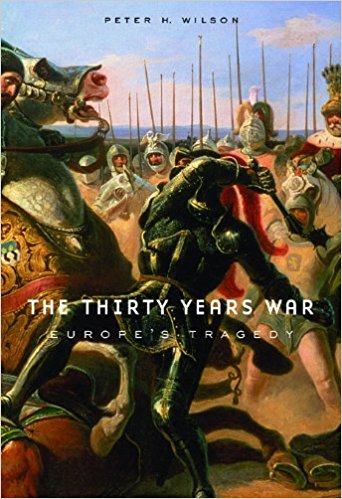 Europes Tragedy Peter Wilson A deadly continental struggle, the Thirty Years War devastated seventeenth-century Europe, killing nearly a quarter of all Germans and laying waste to towns and countryside alike. Peter Wilson offers the first new history in a generation of a horrifying conflict that transformed the map of the modern world.
Europes Tragedy Peter Wilson A deadly continental struggle, the Thirty Years War devastated seventeenth-century Europe, killing nearly a quarter of all Germans and laying waste to towns and countryside alike. Peter Wilson offers the first new history in a generation of a horrifying conflict that transformed the map of the modern world. 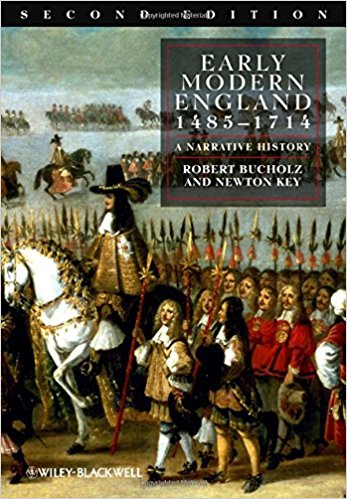 Early Modern England 1485-1714 Robert Bucholz The book traces the transformation of England during the Tudor-Stuart period, from feudal European state to a constitutional monarchy and the wealthiest and most powerful nation on Earth.
Early Modern England 1485-1714 Robert Bucholz The book traces the transformation of England during the Tudor-Stuart period, from feudal European state to a constitutional monarchy and the wealthiest and most powerful nation on Earth. 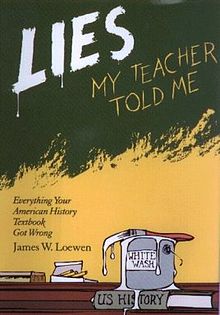 Lies My Teacher Told Me James Loewen In Lies My Teacher Told Me, Loewen criticizes modern American high school history textbooks for containing incorrect information about people and events such as Christopher Columbus, the lies and inaccuracies in the history books regarding the dealings between the Europeans and the Native Americans, and their often deceptive and inaccurate teachings told about America's commerce in slavery. He further criticizes the texts for a tendency to avoid controversy and for their 'bland' and simplistic style.
Lies My Teacher Told Me James Loewen In Lies My Teacher Told Me, Loewen criticizes modern American high school history textbooks for containing incorrect information about people and events such as Christopher Columbus, the lies and inaccuracies in the history books regarding the dealings between the Europeans and the Native Americans, and their often deceptive and inaccurate teachings told about America's commerce in slavery. He further criticizes the texts for a tendency to avoid controversy and for their 'bland' and simplistic style.  Gracefully Insane Alex Beam There are no fences, no guards, no locked gates. But McLean Hospital is a mental institution-one of the most famous, most elite, and once most luxurious in America. McLean 'alumni' include Olmsted himself, Robert Lowell, Sylvia Plath, James Taylor and Ray Charles, as well as (more secretly) other notables from among the rich and famous. In its 'golden age,' McLean provided as genteel an environment for the treatment of mental illness as one could imagine. But the golden age is over, and a downsized, downscale McLean-despite its affiliation with Harvard University-is struggling to stay afloat. Gracefully Insane, by Boston Globe columnist Alex Beam, is a fascinating and emotional biography of McLean Hospital from its founding in 1817 through today.
Gracefully Insane Alex Beam There are no fences, no guards, no locked gates. But McLean Hospital is a mental institution-one of the most famous, most elite, and once most luxurious in America. McLean 'alumni' include Olmsted himself, Robert Lowell, Sylvia Plath, James Taylor and Ray Charles, as well as (more secretly) other notables from among the rich and famous. In its 'golden age,' McLean provided as genteel an environment for the treatment of mental illness as one could imagine. But the golden age is over, and a downsized, downscale McLean-despite its affiliation with Harvard University-is struggling to stay afloat. Gracefully Insane, by Boston Globe columnist Alex Beam, is a fascinating and emotional biography of McLean Hospital from its founding in 1817 through today. 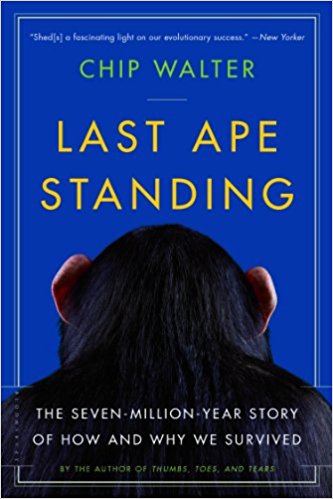 Last Ape Standing Chip Walter Over the past 180 years scientists have discovered evidence that at least twenty-seven species of humans evolved on planet Earth. What enabled us to survive when all the others were shown the evolutionary door?
Last Ape Standing Chip Walter Over the past 180 years scientists have discovered evidence that at least twenty-seven species of humans evolved on planet Earth. What enabled us to survive when all the others were shown the evolutionary door? 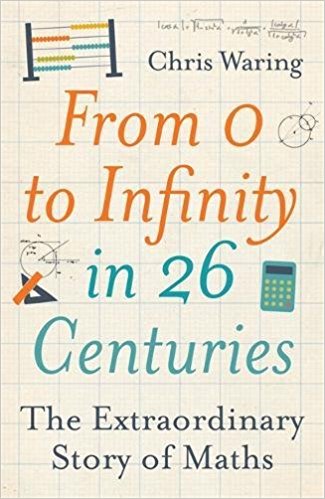 From 0 to Infinity in 26 Centuries Chris Waring We may remember their equations and discoveries from school, but do we remember who the men behind the math were? From the theories of Pythagoras (did you know he ran a secret brotherhood that studied maths, music, and gymnastics?) to coining the term 'Googol,' this book is packed full of fascinating facts and surprising stories from ancient times to the modern day. Do you want to know why the Ancient Greeks knew so much math? Or, why there was so little math studied in the Dark Ages? Read this fascinating book to uncover the mysteries of math.
From 0 to Infinity in 26 Centuries Chris Waring We may remember their equations and discoveries from school, but do we remember who the men behind the math were? From the theories of Pythagoras (did you know he ran a secret brotherhood that studied maths, music, and gymnastics?) to coining the term 'Googol,' this book is packed full of fascinating facts and surprising stories from ancient times to the modern day. Do you want to know why the Ancient Greeks knew so much math? Or, why there was so little math studied in the Dark Ages? Read this fascinating book to uncover the mysteries of math. 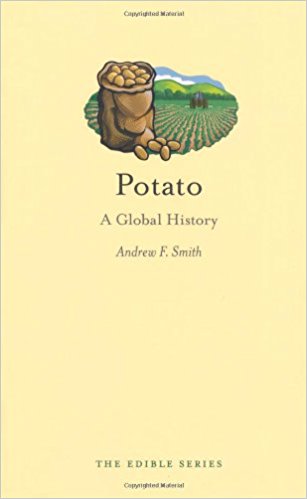 Potato Andrew Smith From obscure Pre-Columbian beginnings in the Andes Mountains to global popularity today, the story of the potato is one of rags to riches. In Potato, esteemed culinary historian Andrew F. Smith reveals the captivating story of a once lowly vegetable that has changed-and continues to change-the world.
Potato Andrew Smith From obscure Pre-Columbian beginnings in the Andes Mountains to global popularity today, the story of the potato is one of rags to riches. In Potato, esteemed culinary historian Andrew F. Smith reveals the captivating story of a once lowly vegetable that has changed-and continues to change-the world. 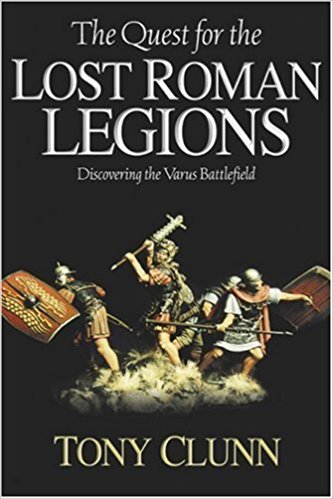 Quest for the Lost Roman Legions Tony Clunn In 9 A.D., the 17th, 18th & 19th Roman legions and their auxiliary troops under command of Publius Quinctilius Varus vanished in the boggy wilds of Germania. They died singly and by the hundreds over several days in a carefully planned ambush led by Arminius-a Roman-trained German warrior determined to stop Rome's advance east beyond the Rhine River. By the time it was over, some 25,000 men, women, and children were dead and the course of European history had been forever altered.
Quest for the Lost Roman Legions Tony Clunn In 9 A.D., the 17th, 18th & 19th Roman legions and their auxiliary troops under command of Publius Quinctilius Varus vanished in the boggy wilds of Germania. They died singly and by the hundreds over several days in a carefully planned ambush led by Arminius-a Roman-trained German warrior determined to stop Rome's advance east beyond the Rhine River. By the time it was over, some 25,000 men, women, and children were dead and the course of European history had been forever altered. " "
